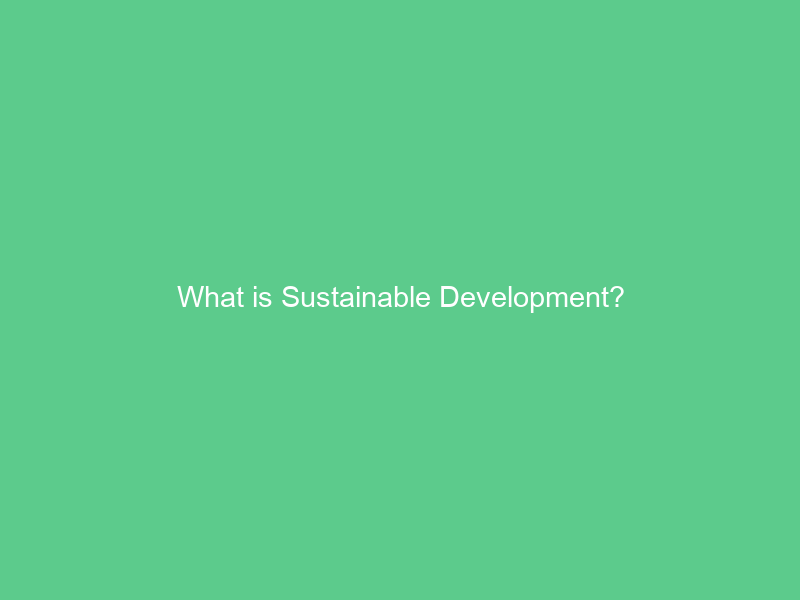Human activities have a major effect on natural systems. Diversions of watercourses, exploitation of resources and emissions of heat-trapping gases into the atmosphere all threaten life-support systems both locally and globally.
Sustainable development – which meets present-day needs without jeopardizing future generations’ ability to meet their own requirements- is therefore of great significance.
Economic Development
The Sustainable Development Goals (SDGs) represent an ambitious agenda to combat extreme poverty, hunger and inequality while safeguarding our planet. In order to meet this ambitious objective, businesses play a pivotal role. First by acting responsibly – by adhering to the Ten Principles of the UN Global Compact in their operations – and secondly by seeking opportunities through innovation and partnership to solve societal challenges through business innovations and collaborations.
Reaching sustainable development requires that people have access to decent jobs and quality healthcare, affordable energy, education and clean water, while natural resources are used wisely and regeneratively. The Sustainable Development Goals also encompass targets on climate change mitigation and social inclusion.
However, goals can often have tradeoffs; for instance, ending hunger may necessitate cutting down forests to increase agricultural production but this could result in environmental degradation, soil erosion and air pollution. Therefore, sustainability balances three domains or spheres: economic, environmental and social conditions as illustrated in Figure 2. This highlights their interrelatedness while simultaneously creating an orderly hierarchy among them.
Social Development
Social development entails providing people of diverse needs, customs and values a good quality of life. This involves commitments to economic and social justice, human rights protections, community development efforts as well as developmental social services promotion.
Sustainable development includes creating the conditions necessary for its own realization, such as access to decent work and quality health care, education, peace and security and natural resource use that does not pollute or cause permanent losses; while eliminating poverty, hunger, environmental destruction and inequality.
Social development emerged during the period of worldwide decolonization, when nations believed they would gradually achieve societies characterized by welfare, equity, social order, democracy and autonomy. Unfortunately, over time it became evident that this vision was flawed and alternative paths must be explored to reach these idealistic outcomes.
Environmental Development
Environmental development refers to the processes by which societies manage their natural resources in a sustainable fashion for future generations, prioritizing conservation and protection over economic or social progress. It seeks to achieve economic and social progress without jeopardizing our planet’s ability to support human life.
This goal can be reached through adopting “green technologies”, which use less resources and have lower environmental impacts than conventional ones. Furthermore, cutting consumption levels among society members as well as curbing population growth to prevent over-exploitation of Earth’s natural resources is also vital in reaching this objective.
As economic development requires more resources for growth, so does our need to protect natural resources and balance ecological with social needs. This need is reflected in the global sustainability agenda which sets goals such as poverty reduction, climate change mitigation and resource preservation. However, this complex issue often necessitates compromise between various parties and interests: for instance poor people must sometimes sacrifice sustainable livelihood opportunities just to survive while richer countries may cause harm through environmental-damaging practices.
Political Development
Sustainable development (SD) became widely known with the publication of Brundtland Report “Our Common Future” in 1987. SD can be defined as development that meets present-generation needs without undermining future generations’ ability to meet theirs.”
Natural resources on Earth are limited and nonrenewable, and must be utilized within their carrying capacity of the planet (Du & Kang 2016). Economic growth was previously assumed to replace natural capital consumed during production processes with economic expansion; however, recent evidence shows this postulate may no longer hold.
An integrated approach to economic, social and environmental development demands that all individuals understand that their survival depends on responsible consumption and production practices, environmental stewardship and progressive social values. With this knowledge comes an understanding of sustainability; thus inspiring attitudes and practices which promote it. For this to occur effectively a consistent education program must be implemented by governments, international agencies and civil society organisations.

